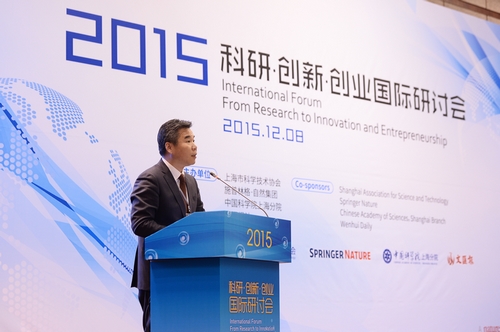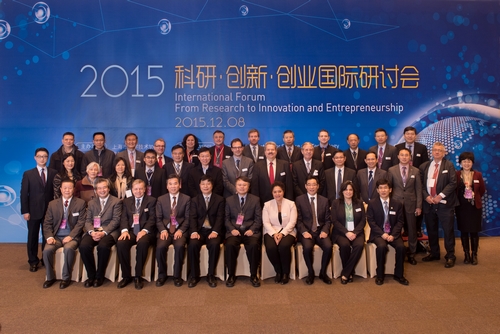December 8, 2015, Shanghai, China ---- The international forum “From Research to Innovation and Entrepreneurship” was kicked off today in Shanghai and attended by over 200 scientists, University Presidents, policy makers, R&D executives and business leaders from home and abroad, who focused on how research and science can drive innovation, fuel entrepreneurship, and ultimately build a sustainable knowledge economy in China. The forum was co-organized by the Shanghai Association of Science and Technology, Springer Nature, the Chinese Academy of Sciences Shanghai branch and Wenhui Daily. It was launched following the successful international symposium held last year on research assessment and evaluation.

Addressing the forum, Zhu Zhiyuan, President of Chinese Academy of Sciences Shanghai Branch, said: “Give full play to the leading role of the backbone of national research institutions, the research institutes of Chinese Academy of Sciences in Shanghai are fully stimulating research vitality and innovation potential of the research team by constantly reform and innovation. We will make our great efforts and important contributions to the process of scientific and technological innovation center with global influence in Shanghai..”
The forum consists of two keynote presentations and four panel discussions.
Sung-Mo Steve Kang, President of the Korea Advanced Institute of Science and Technology (KAIST), delivered a keynote presentation entitled “Innovation and entrepreneurship in KAIST”. Established in 1971, KAIST is a research-focused university aiming to foster human resources in science and technology needed by Korea. It ranks 10th on Thomson Reuters’ list of the world’s Most Innovative Universities. Steve introduced KAIST’s core values of “Creativity and Challenge” and demonstrated, through case studies, how the Institute strengthens collaboration between industry, academia and research, and forms education-industry synergies. “KAIST has become the cradle for Korea’s venture companies by launching a variety of programs in support of new technology start-ups and ventures,” he said.
In his keynote presentation entitled “The components of a successful research to innovation pipeline”, Dr. Bernie Meyerson, Chief Innovation Officer of IBM, discussed key elements of sustainable innovation. Among these, people are put first, with their ability to take a global view and focus on clients. Dr. Meyerson emphasized that commercial companies must engage universities because they create the next generation of innovators who then drive global prosperity. He also underlined how challenges are instrumental in driving innovation. “With the basics in place, grand challenges are highly effective in driving ideas from basic research to broadly deployed innovations,” he said. “If you want greatness, pick great challenges.”

Experts from China and other parts of the world also addressed challenges in moving forward research, innovation and research commercialization in panel sessions, aiming to address subjects such as talent resources and the direction of technological innovation, as well as how China can overcome these challenges. The topics for panel discussions included: the role of research institutions in creating innovations with societal impact; from idea to startup; researchers, innovators and entrepreneurs - the talent that drives the innovations that matter and creating technologies that the world wants and needs.


